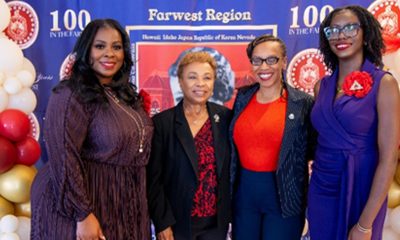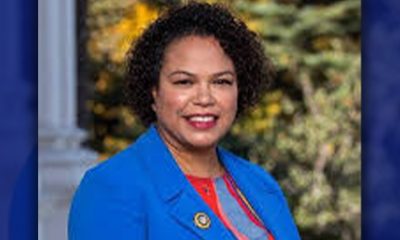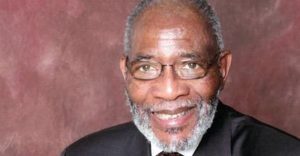Black History
Organization honors four leaders for Black History Month
WAVE NEWSPAPERS — The Foundation Center LA was filled to capacity when the Vermont Slauson Economic Development Corporation honored four community leaders who have made significant contributions to the community.
By Shirley Hawkins
SOUTH LOS ANGELES — The Foundation Center LA was filled to capacity Feb. 12 when the Vermont Slauson Economic Development Corporation honored four community leaders who have made significant contributions to the community.
Honored were Leo D. Sullivan, president and CEO of Leo Sullivan Multimedia and creator of the interactive website Afrokids.com and AfroKidsTV.com; Jeanette Bolden, owner of the 27th Street Bakery and a former track and field Olympian; Ron Turner, general sales manager at 102.3 KJLH radio; and Gloria Zuurveen, founder of PACE news.
Special tributes filled the room in honor of Marva Smith Battle-Bey, the founder of the VSEDC, who died in 2016.
“You make Marva Battle-Bey proud because the legacy of entrepreneurship continues through you,” said Apryl Sims, who served as mistress of ceremonies. “All of our ancestors stood and endured so that each and every one of us could be here right now. Let’s continue to lift each other up for the future generations to come.”
The VSEDC offers a variety of business workshops, including an entrepreneurial training class and a business plan writing class.
Joseph T. Rouzan II, president and CEO of the VSEDC, thanked board chair Bill Holland and board members and as well as the event’s sponsor, Boston Private Community Investment, for their unwavering support for local entrepreneurs.
“We are honoring the achievements of remarkable African Americans who have made tremendous marks in their respective industries and beyond,” Rouzan said.
“Vermont Slauson takes pride in our nearly four-decade history of fighting for economic resources that help South Los Angeles residents thrive and celebrate the glorious contributions of black Americans,” Rouzan said. “This month and all year reminds us of how far we’ve come and inspires us to achieve so much more.”
Rouzan said that because of Battle-Bey’s sharp business acumen and foresight, she was able to negotiate the purchase of two busy shopping centers in South Los Angeles that are owned by the VSEDC.
Sims, a fourth generation entrepreneur at the health food venue Simply Wholesome, added that Simply Wholesome recycles dollars throughout the community by purchasing products from more than 100 local vendors. Sims also is the creator of Life in a Bottle, a line of cold pressed juices sold exclusively at Simply Wholesome.
Applause filled the room as Bolden, a third-generation entrepreneur, ascended to the podium and said that she was gratified to receive her award.
She said that her grandfather, Harry Patterson, started the 27th Street Bakery in 1956.
The bakery is the largest manufacturer of sweet potato pies on the West Coast and produces fruit, sweet potato, pecan, pumpkin and peach pies that are sold at Ralph’s, Smart and Final, Louisiana Fried Chicken, 7-Eleven, Albertson’s and KFC.
“My grandfather, Harry Patterson, said to never cut corners when making our pies and to always use the highest quality ingredients,” Bolden said. “He advised us to take care of the business yourself and to always work hard.”
Bolden said she is continuing his legacy by teaching her children how to operate the business.
Bolden won an Olympic gold medal in the 1984 Olympics in the women’s 4 by 400 meter relay. She spent 24 years as a collegiate women’s track and field coach, including serving as head coach at her alma mater, UCLA.
Among her numerous track and field achievements, Bolden served as the U.S Olympic Women’s head coach in 2008.
Animator Sullivan smiled as the crowd applauded and he thanked VSEDC for his award. Sullivan has produced and directed educational, training and public service films for various educational film companies, working as a producer, director, animator, layout artist, storyboard artist and writer at studios including Warner Brothers, New World, Filmnation, Hanna Barbera and Walt Disney.
He also has managed animation studios all over the world including the countries of Thailand, Spain, France, Canada and the United States.
“I’m trying to forge communication with the youth through media by building our children’s self-esteem and cultural heritage with positive images by teaching life lessons, family values, respect and responsibility,” he said.
“A lot of media outlets put trash in the young people’s minds and that’s what I want to fight against. That’s why I launched AfroKids.com and AfroKidsTV,” said the animator, who added that both outlets promote positive, uplifting stories that can currently be viewed on Roku, Amazon and YouTube.
Pausing, he added that he developed the Leo Sullivan Multimedia Foundation to offer a hands-on, introductory workshop in animation and game development to disadvantaged youth between the ages of 10 to 15.
“I focus on the kids from the next generation. If we don’t give them any direction, other folks will take over their minds,” he said.
Turner, sales manager at KJLH Radio, is instrumental in connecting businesses to the station’s listening audience. He also is credited with helping to create Southern California’s largest African-American targeted event, the Taste of Soul.
“We have served the African-American community for 54 years,” said Turner. “We not only entertain, we educate — and we have to make sure that KJLH stays viable for another 54 years.”
Pausing, Turner added, “Our ongoing fight is to secure advertising dollars from companies that feel that African Americans don’t buy Cadillacs, Tide or Mercedes Benzes,” he said.
Zuurveen, founder of PACE News, a licensed minister and a staunch supporter of education, said, “History is very critical, especially black history, because we are being wiped out.”
Zuurveen said she started the publication after hearing a teacher at her daughter’s school declare that black children were going to grow up to become “hoochie mamas” and “gang bangers.”
“Every Wednesday, I was at the school board to complain. I wrote articles about that teacher,” she recalls, adding that because of the articles, the teacher eventually resigned.
“We have to get serious about our history and legacy so that we can survive,” Zuurveen said. “Our history is too important to let slide.”
This article originally appeared in the Wave Newspapers.
Activism
Oakland Post: Week of November 26 – December 2, 2025
The printed Weekly Edition of the Oakland Post: Week of November 26 – December 2, 2025

To enlarge your view of this issue, use the slider, magnifying glass icon or full page icon in the lower right corner of the browser window.
Activism
Oakland Post: Week of November 19 – 25, 2025
The printed Weekly Edition of the Oakland Post: Week of November 19 – 25, 2025

To enlarge your view of this issue, use the slider, magnifying glass icon or full page icon in the lower right corner of the browser window.
Activism
IN MEMORIAM: William ‘Bill’ Patterson, 94
Bill devoted his life to public service and education. In 1971, he became the founding director for the Peralta Community College Foundation, he also became an administrator for Oakland Parks and Recreation overseeing 23 recreation centers, the Oakland Zoo, Children’s Fairyland, Lake Merritt, and the Henry J. Kaiser Convention Center.

William “Bill” Patterson, 94, of Little Rock, Arkansas, passed away peacefully on October 21, 2025, at his home in Oakland, CA. He was born on May 19, 1931, to Marie Childress Patterson and William Benjamin Patterson in Little Rock, Arkansas. He graduated from Dunbar High School and traveled to Oakland, California, in 1948. William Patterson graduated from San Francisco State University, earning both graduate and undergraduate degrees. He married Euradell “Dell” Patterson in 1961. Bill lovingly took care of his wife, Dell, until she died in 2020.
Bill devoted his life to public service and education. In 1971, he became the founding director for the Peralta Community College Foundation, he also became an administrator for Oakland Parks and Recreation overseeing 23 recreation centers, the Oakland Zoo, Children’s Fairyland, Lake Merritt, and the Henry J. Kaiser Convention Center.
He served on the boards of Oakland’s Urban Strategies Council, the Oakland Public Ethics Commission, and the Oakland Workforce Development Board.
He was a three-term president of the Oakland branch of the NAACP.
Bill was initiated in the Gamma Alpha chapter of Kappa Alpha Psi Fraternity.
In 1997 Bill was appointed to the East Bay Utility District Board of Directors. William Patterson was the first African American Board President and served the board for 27 years.
Bill’s impact reached far beyond his various important and impactful positions.
Bill mentored politicians, athletes and young people. Among those he mentored and advised are legends Joe Morgan, Bill Russell, Frank Robinson, Curt Flood, and Lionel Wilson to name a few.
He is survived by his son, William David Patterson, and one sister, Sarah Ann Strickland, and a host of other family members and friends.
A celebration of life service will take place at Henry J. Kaiser Convention Center (Calvin Simmons Theater) on November 21, 2025, at 10 AM.
His services are being livestreamed at: https://www.facebook.com/events/1250167107131991/
In lieu of flowers, donations can be made to the Euradell and William Patterson scholarship fund TBA.

-

 Activism4 weeks ago
Activism4 weeks agoOakland Post: Week of November 12 – 18, 2025
-

 Activism3 weeks ago
Activism3 weeks agoIN MEMORIAM: William ‘Bill’ Patterson, 94
-

 Activism4 weeks ago
Activism4 weeks agoHow Charles R. Drew University Navigated More Than $20 Million in Fed Cuts – Still Prioritizing Students and Community Health
-

 Bay Area4 weeks ago
Bay Area4 weeks agoNo Justice in the Justice System
-

 #NNPA BlackPress3 weeks ago
#NNPA BlackPress3 weeks agoLewis Hamilton set to start LAST in Saturday Night’s Las Vegas Grand Prix
-

 #NNPA BlackPress2 weeks ago
#NNPA BlackPress2 weeks agoBeyoncé and Jay-Z make rare public appearance with Lewis Hamilton at Las Vegas Grand Prix
-

 Activism2 weeks ago
Activism2 weeks agoOakland Post: Week of November 19 – 25, 2025
-

 #NNPA BlackPress4 weeks ago
#NNPA BlackPress4 weeks agoThe Perfumed Hand of Hypocrisy: Trump Hosted Former Terror Suspect While America Condemns a Muslim Mayor



























































